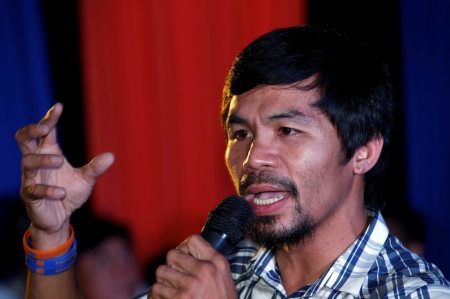Manny Pacquiao Cites Bible in Call to Restore Death Penalty in Philippines

Popular Christian boxing icon and Filipino senator Manny Pacquiao has called for drug dealers and other perpetrators of serious crimes to be put to death, saying that the Bible has given the government authority to do so.
The 37-year-old Pacquiao, one of the most revered boxers and Christian celebrities on the planet, gave his first speech as a senator during a legislative session last week. The "Pacman" called for the restoration of capital punishment, saying that doing so would benefit many of law-abiding Filipinos.
Although the death penalty was repealed in the Philippines in 2006, Pacquiao talked about the destruction and "havoc" that the illegal drug trade is causing in the Philippines.
"My first ever speech as a senator will focus on one of the biggest issues plaguing our country," Pacquiao said. "I speak before you because of the signs of urgency on the issue of drug problem which has become alarming as it gets worse each day."
In calling for the death penalty to be restored, the devout born-again believer cited several verses from the Bible to justify the morality in the government taking the life of criminals.
"[The] death penalty is lawful, moral and sanctioned governmental action. Having read the Bible on a regular basis, I am convinced that God is not just a God of mercy, but He is also a god of justice," Pacquiao asserted. "So, on the issue of the death penalty, I could not help but consult the Bible."
"I found numerous verses and here are some," Pacquiao added.
Pacquiao first cited Genesis 9:6, which states: "Whoever sheds human blood, by human shall their blood be shed; for in the image of God has God made mankind."
Pacquiao then moved to Exodus 21:12, which reads: "Anyone who strikes a person with a fatal blow is to be put to death."
In shifting to the New Testament, Pacquiao cited Romans 13:4.
"For the one in authority is God's servant for your good. But if you do wrong, be afraid, for rulers do not bear the sword for no reason," the verse reads. "They are God's servants, agents of wrath to bring punishment on the wrongdoer."
Pacquiao warned congress that the drug trade is such a problem that "even innocent citizens who renounce drugs can be a victim once an addict goes out to street and wreak havoc."
"Drug addicts are addicted to drugs, while drug lords are addicted to money," he added. "We must speak to the criminal minds in the only language they understand. They must understand that our government will put a stop to impunity. They have profited from the blood of thousands upon thousands of Filipino youths. It must stop now."
He cited data from the 2015 Philippine Drug Enforcement Agency, which found that 26.91 percent of the neighborhoods in the country are considered "drug affected." However, that number increased to 92.44 percent of drug affected neighborhoods in the national capital region as of June 2016.
Although Pacquiao is calling for capital punishment, he stressed that the rights of suspects to fair trials must be respected. He also stressed if the government is not doing enough to hold criminals accountable, citizens might be liable to take the law "in their own hands."
It is a bit ironic that Pacquiao cites the Bible to restore the death penalty even though the repeal of the death penalty was signed into law by the nation's former President Gloria Arroyo right before she went to visit Pope Benedict XVI, who called on countries around the world to end capital punishment.
The death penalty in the Philippines was originally repealed in 1987 but was reinstituted in 1993 before being repealed again in 2006.





















